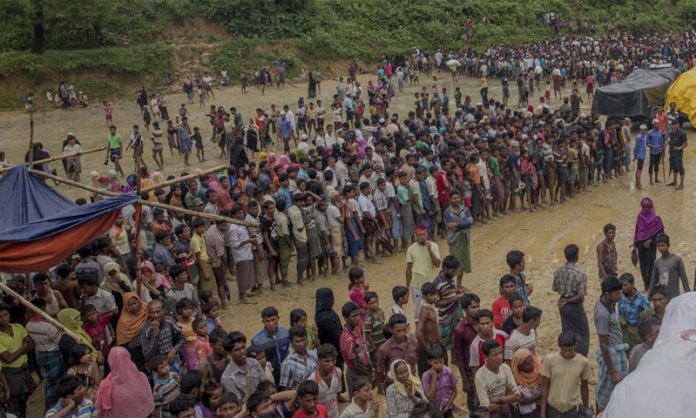COX’S BAZAR: More than 10,000 Muslim Rohingya have massed in Myanmar near a crossing point into Bangladesh, Myanmar media said Tuesday, apparently poised to join an exodus across the border due to food shortages and fear of attacks in their mainly Buddhist homeland.
Over 500,000 Rohingya have streamed into Bangladesh in just the past five weeks, and numbers are again swelling, raising doubt about the practicality of a Myanmar proposal to begin repatriating them.
Myanmar’s northern state of Rakhine has been emptied of half of its Rohingya population in weeks.
More are on the move as insecurity presses them to leave those villages which have so far been spared the worst of the violence that ripped through the state.
Attacks by Rohingya militants on August 25, spurred a ferocious Myanmar army crackdown that the UN says amounted to “ethnic cleansing”.
Over 10,000 “Muslims” have arrived “between Letphwekya and Kwunthpin village to emigrate to the neighbouring country”, the state-backed Global New Light of Myanmar newspaper reported Tuesday.
Myanmar’s government refuses to recognise the Rohingya as a distinct ethnic group, instead calling them “Muslims” or “Bengalis” — code for illegal migrants from Bangladesh.
Authorities have tried to reassure fleeing Rohingya that they are now safe in Rakhine, the report added, but they want to leave “of their own accord”.
Violence appears to have ebbed in northern Rakhine, although independent reporting is still blocked by an army lockdown.
But fear has unsettled many of the Rohingya who remain, trapped between Myanmar’s army and their hostile ethnic Rakhine neighbours and cut off from aid agencies.
After a brief lull in arrivals, the Bangladesh Border Guard says 4-5,000 Rohingya are now crossing each day.
“They don’t want to stay (in Myanmar). They want to come here… they are being told to leave,” Lieutenant-Colonel S.M Ariful Islam told AFP.
Food is also running out, with villagers too fearful to tend to their crops in case they are attacked by their neighbours.
“In some villages they are scared to pass by Rakhine villages,” Chris Lewa, from Rohingya advocacy group the Arakan Project, told AFP.
On occasions when the Rohingya village chief decides to leave, the whole hamlet will follow, emptying a village “in just a few hours”, she said.
Myanmar denies most Rohingya citizenship and the public in the Buddhist-majority nation does not want them back.
Myanmar’s army has carefully shaped perceptions of the Muslim group, branding them illegal immigrants intent on imposing Islam via the country’s western gateway.
On Monday Myanmar’s Minister of the Office of State Counselor, Kyaw Tint Swe, told Bangladesh his country was ready to accept refugees subject to a verification process agreed in the early 1990s by the neighbours.
Under that agreement nearly a quarter of a million Rohingya were repatriated from Bangladesh to Myanmar between the early 1990s and 2005, he explained.
The minister’s offer applies only to those who fled in the past year, according to a Bangladeshi official — excluding some 300,000 Rohingya who fled earlier.
And refugees and rights groups say the verification which Myanmar wants will leave huge numbers in the squalid refugee camps in Bangladesh, since it relies on documentation which most Rohingya do not have.





